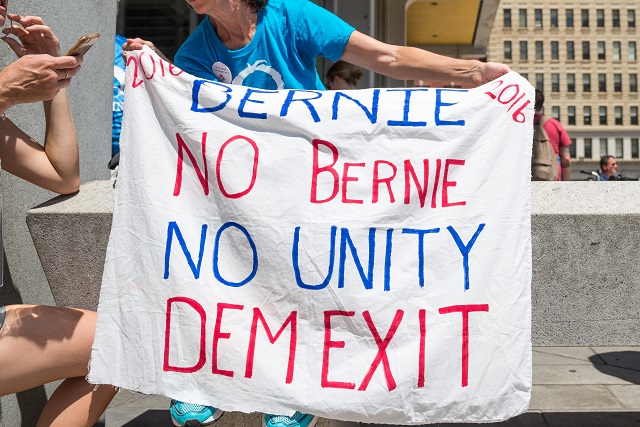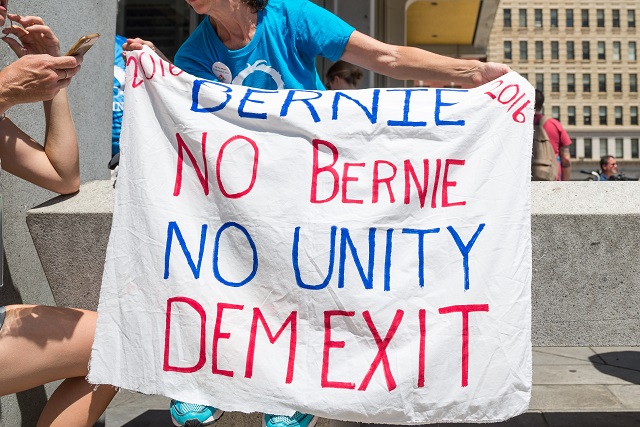
 Pro-Bernie Sanders demonstrators display their political allegiance through shirts, signs, and flags showing their disapproval of Hillary Clinton and advocate for a “DemExit” as a political revolt. (Photo: Albin Lohr-Jones/ Pacific Press/ LightRocket via Getty Images)
Pro-Bernie Sanders demonstrators display their political allegiance through shirts, signs, and flags showing their disapproval of Hillary Clinton and advocate for a “DemExit” as a political revolt. (Photo: Albin Lohr-Jones/ Pacific Press/ LightRocket via Getty Images)
During the 2016 campaign, a big reason that Hillary Clinton lost — according to longtime Democratic pollster and Clinton associate Stan Greenberg — was that her campaign didn’t look at what was happening on the ground in the final stretch in states like Michigan, where Donald Trump beat Clinton by the smallest margin of any state. The Clinton campaign stopped local tracking polls, pulled back on messaging and lost a state where voters that spring had enthusiastically delivered a presidential primary victory to Bernie Sanders.
Greenberg’s analysis is among a handful of recent reports suggesting what Democrats need to do differently as they look to 2018. But where he focuses on campaign nuts and bolts, and an upcoming New York Times Magazine story traces a hapless search for a compelling message, another report this week says the answer is staring the Democratic National Committee in the face — but they don’t see it.
“There has been a real desire for the national Democratic Party to learn key lessons from 2016,” said Norman Solomon, who organized 2016’s Bernie Delegates Network and is one of four co-authors of “Autopsy: The Democratic Party in Crisis.” “While there’s been real progress in some state parties and local party entities, there are very few indications that the national Democratic Party has done much but double down on a failed set of policies.”
The national party hasn’t found ways to embrace those who elected 46 percent of delegates to 2016’s national convention. The DNC still does not know how to deal with these Berniecrats, even though some state parties have found ways to bridge gaps and cultivate relationships for 2018.
The DNC’s key failures, as elaborated by the “Autopsy” report, differ from Greenberg’s postmortem and the upcoming Times Magazine piece. Those portray national leaders either as clueless about their shortcomings or adrift in seeking a compelling message to rebuild their brand. In contrast, Solomon’s report emphasizes the DNC continues to run much as it did in 2016 — when it didn’t recognize or respect Sanders’ candidacy or the supporters drawn to the Vermont senator.
Since the election, the DNC has not made any structural changes to build bridges to the party’s Berniecrats, such as reforming its superdelegate system. In 2017 races like Virginia’s gubernatorial election, the way party leaders haven’t changed their voter outreach strategy is also offputting, Solomon said, because it’s prioritized white centrists and appears to take non-white voters for granted.
“The DNC’s biggest failure has been to largely disregard the base,” he said. “And we can define that as working-class people across the board, young people, people of color, to instead focus a tremendous amount of political framing, of pitching, and of money to try to shake loose votes from Republicans. We have this empirically going on in the past and in Virginia right now. Steve Phillips had that piece in The Nation [“The Obsession With White Voters Could Cost Democrats the Virginia Governor’s Race“]. That’s one huge thing; the idea that the way to Democratic Party victories is through pulling in some Republican votes. I just think it’s been disproven again and again. That’s number one. Stop doubling down on a failed policy.”
That mindset leads to the next failure, Solomon said, which is the party’s longtime habit of patronizing constituencies under the false assumption that because they have liberal values they will always vote for Democrats. That is seen by the DNC’s failure to embrace social change movements. Instead, top party leaders rely on insider-driven affirmative action, such as appointing a few representatives of movement constituencies to be voting members of the DNC — as occurred at its recent meeting in Nevada.
“That relationship to social movements has to stop being simply opportunistic in terms of symbolism,” Solomon said. “There needs to be substantive engagement 52 weeks a year, not just election season, and a recognition that for so many people, for good reasons, social movements are not, and should not, be a subset of campaigns. It should be the reverse, that election campaigns are part of social movements.”
Arguably most important of all, the party has to phase out its anti-democratic features, starting with its superdelegate system, which accounts for one-sixth of all the votes to nominate presidential candidates (and which has corollaries in states like California, where unelected delegates stopped a Berniecrat from being elected state chair). This continues with a long list of DNC actions in 2016 that were biased toward Clinton.
“A party with Democratic as its first name has to stop being undemocratic internally,” Solomon said. “Even if people running the national party don’t care for any other reason, they should care because it keeps people home rather than voting. It depresses enthusiasm, volunteers and contributions. It certainly harmed the contribution levels of the DNC in the last 50 weeks. (It has taken in half of its Republican counterpart.) We have the same people in some major positions who were party to an unfair process; what is, according to the party charter, supposed to be an evenhanded in the presidential primary and caucuses.”
Where the “Autopsy” report agrees with Greenberg’s take is the same data-driven political consultants who misread Sanders’ impact and resonance ran the Clinton campaign. This goes beyond nerd-bashing, Solomon said, as it underscores what’s most obvious about Sanders’ appeal that the DNC doesn’t grasp. “When the Bernie campaign started out in 2015, all those smart guys and gals at the DNC and the punditocracy said, ‘He’ll maybe get single digits,'” he said. “They did all the calculations except [considering] the moral momentum of making clear, ethical, compelling statements.”
During the 2016 Democratic National Convention, the party agreed to reform the superdelegate system. But that concession to Sanders has gotten bogged down in meetings since then. As a state vice-chair told AlterNet last week, the superdelegates are never going to surrender their power, because that perk is a reward for the unheralded work those organizers and activists do between presidential elections.
The resulting problem, Solomon said, is the DNC is protecting people and traditions at the expense of the very people the party needs to move forward.
“If there’s one word that epitomizes all this, it’s the word priorities,” he said. “When we know that voter suppression, not only voter ID but other forms, is such a huge factor, certainly a significant factor without any doubt, then why has, as we refer to in the report, the staffing been so paltry at the DNC to focus on that issue? I hate to think of what they spend on food and drink in their budget line items compared to having a — how can you, in mid-May of this year, only have one staff person, a total of one full-time staff person, devoted to voter suppression? And then with a big drum roll in late spring, they said, ‘Okay, we’re going to expand it to four.’ This just to me is unconscionable.”
These criticisms could be dismissed as inevitable intra-party strife, with the old guard and new guard vying for power. But the Democratic Party has suffered terrible losses this decade. It has nearly 1,000 fewer elected representatives in state legislatures and federal office compared to before President Obama’s term. The Republicans’ extreme partisan redistricting has created red supermajorities in states that should be purple, like Georgia, North Carolina, Michigan and Wisconsin. And it’s created a GOP lock on the House, where Democrats need to win 24 additional seats in 2018 for a majority.
All of this means the Democrats can’t rely on special counsel Robert Mueller, the Trump White House or the Republican-led Congress to deliver sought-after victory. They need positive messages and messengers that resonate locally.
“In a matter of months it’s going to be in the throes of the midterm election. We need to get up a head of steam before then,” Solomon said. “One thing we tried to emphasize in the report is to say, this is about defeating Republicans and promoting progressive values. Presumably, we could unite behind all of that, and I think arguments need to be made that the conventional wisdom doesn’t work. It’s not a left-right divide per se.”
“We need to say we need more democracy in the party,” he continued. “Just as we’ve seen with many social movements, like the antiwar movement and more recently for gay rights, gay marriage, and Black Lives Matter, and so forth. What is unthinkable from the party center or centrists becomes thinkable within a year or two when there’s enough education, agitation, organizing. I think that really is the path forward.”
Join us in defending the truth before it’s too late
The future of independent journalism is uncertain, and the consequences of losing it are too grave to ignore. To ensure Truthout remains safe, strong, and free, we need to raise $44,000 in the next 6 days. Every dollar raised goes directly toward the costs of producing news you can trust.
Please give what you can — because by supporting us with a tax-deductible donation, you’re not just preserving a source of news, you’re helping to safeguard what’s left of our democracy.